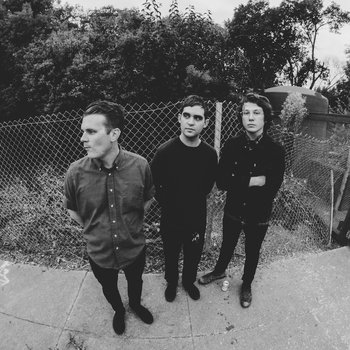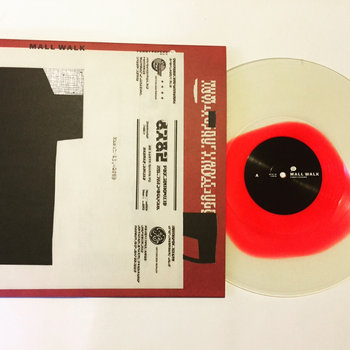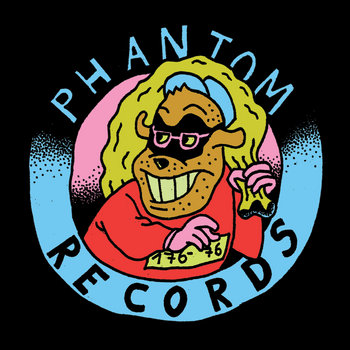
First, a disclaimer: The term “post-punk” is a wide net cast around a range of sounds and styles that rose from the ashes of the late ‘70s punk explosion, developed by a collection of forward-thinking rock bands that weren’t necessarily connected and often sounded quite different. These eclectic origins mean that post-punk as a definable genre is somewhat difficult to pin down. “Post-punk has become such an umbrella term,” says Rob I. Miller of the Oakland groups Dry Erase and Blues Lawyer. “I’ve seen now…this might be the 4th or 5th post-punk revival.”
Whatever number we’re on, post-punk’s latest revival is alive and well in Oakland, California. Or at least, that’s what I’m told a couple months after moving to the Bay Area, when I ask one of the performers at a Bottom of the Hill show about bright spots in the region’s music scene. Ok, so technically they didn’t use the term “revival,” but they did say that there were a lot of great post-punk bands kicking around Oakland.
The Bay Area’s inclusive music taste makes it particularly fertile ground for a genre as nebulous as post-punk. “You go to Oakland or San Francisco, and there’s just a ton of shows with bills that are varied and diverse, and everyone’s into it,” says Josh Bertram, vocalist in Oakland band Club Night. “So you got a lot of experimentation going on.” Chris Natividad of Marbled Eye agrees: “That’s kind of what attracted us to Oakland, too, that everyone was open to new sounds.”
Oakland’s experimental bent was nurtured by its DIY artist community, which flourished in the early and mid-‘10s, when access to low-cost performance venues was plentiful. “At the time in Oakland, there were a lot of warehouse shows that were happening constantly,” says Natividad. “You could go to like one or two shows a night.” Back then, Oakland also boasted a lower cost of living that made it something of an artistic haven relative to neighboring San Francisco. “There was such a wealth of musicians to collaborate with,” says Miller, who participated through his band Mall Walk at the time. “Everybody could afford to work coffee shop jobs and still pay rent.”

 . 00:10 / 00:58
. 00:10 / 00:58 
This shifted over the last decade, as San Francisco’s tech-driven gentrification spilled over into neighboring cities. Venues also began shutting down, first slowly as rents rose, and then more rapidly after 2016, when a fire claimed 36 lives during a show at the warehouse-turned-artists collective known as Ghost Ship. “It was just absolutely horrible,” says Miller. “But then also the way the city responded, by basically just shutting down a lot of venues and evicting people. That sort of thing made it really difficult for the DIY scene to thrive there for a while.”
Difficult, yes; but not impossible. I see this first-hand when I go watch the band Parallel play at a venue near downtown Oakland, which looks like it’s set up in someone’s studio apartment. At one end of the room, a performance space has been rigged with colorful moving lights, and a mismatched assortment of couches and chairs line the audience floor in front of it. At the other end is a small open kitchen, where venue staff sell seltzer waters and similar drinks out of the fridge. The vibe is comfortable and relaxed, like a hang-out hosted at your friend’s house—albeit with better mood lighting and a speaker set that’s incompatible with uptight neighbors.
This close-knit feel is another one of Oakland’s strengths. “It’s a small big city in a way that I personally really like,” says Estella Violet of Parallel, before the show. “People know each other, and there’s like a hominess, a comfort.” Bassist Kristen Addison agrees, noting that this adds to Oakland’s willingness to mix things up musically: “There’s a lot of cross-over for different scenes because everyone’s friends.”
These quotes circle the sweet spot that Oakland is able to hit: Large enough to contain multitudes, but not so large that those multitudes can wall themselves off into self-contained siloes. The ease with which Oakland bands cross-pollinate creates a culture where new sonic ideas are constantly being explored, an atmosphere that characterizes the region’s post-punk scene more than any specific sound. “Post-punk is just people looking for the unpredictable songs that are a little weirder,” says Natividad. “It’s something just a little bit off-kilter.”
This gets to the heart of why post-punk needs so many disclaimers: It’s difficult to trace the boundaries of a genre whose defining feature is an indifference to boundaries. “If you’re talking about what would be called ‘post-punk,’ it’s not really a sound,” says Andy Jordan, a prolific rock artist and member of influential Oakland post-punk outfits like The World. “It’s more of an approach, or a method.” Miller agrees, pointing to this as the unifying element for the genre’s otherwise disparate pioneers. “All these bands seemed pretty radically different, but they’re all informed by punk ethics and ethos and doing things differently.”


In the Bay, this open-minded approach is helped along by the region’s legacy of embracing radicalism in both art and politics, from the ‘60s hippie movement and the Black Panthers through to Deerhoof and Xiu Xiu. “Oakland in particular was the most ‘no gods, no masters,’ creatively, of places that I’ve been” says Bertram’s bandmate Devin Trainer, who relocated to Oakland from Portland, Oregon over a decade ago. Bertram, who moved to Oakland from Detroit around the same time, agrees. “People feel free here to explore whatever they want to do.”
Drawing from this acute sense of artistic freedom, it’s not surprising that Oakland’s music scene has grown to reflect the full scope of styles that developed in post-punk’s initial wave. Its DIY roots are roughed up but certainly not KO’d; even for relative outsiders like myself, it doesn’t take long to see flashes of what made—and still makes—its music scene great. “Somewhere like here,” Violet comments when I ask for examples of the old Oakland making a comeback, gesturing at the cozy venue they’re about to perform in. “This is cool. This feels like the whole Oakland show kind of vibe.”
That’s one revival I imagine the Bay will be happy to see. For everyone else, you can check out some of the bands that are active in it below.


Marbled Eye’s forcefully full-bodied rock has ample differences with GoF’s angular sonic assaults—there is, for example, a coldness to Marbled Eye’s riffs that they don’t try to smooth over with Andy Gill-ish nods to danceability—but their latest album, Read the Air, takes some cues from Entertainment!, opening with a pounding guitar sequence that hits as hard as anything post-punk has served up since “Ether.” The band backs this up with an omnivorous artistic attitude that their ’80s-era forefathers would certainly recognize. “I try some shit out, but underneath it I’ll keep it punk too,” Natividad says with a grin.


Parallel cite atmospheric Manchester band the Chameleons as a more immediate influence on their dream-tinged take on post-punk, but Parallel’s 2022 EP also explores a similar kind of gloomy elegance that fellow Mancunians Joy Division evoked on Unknown Pleasures. Signed to the eclectic local label Cherub Dreams, Parallel is understandably coy when asked about classifiers. “Some people will say post-punk, some will say dream pop,” explains singer/guitarist David Imhoff. “They all sort of make sense in their own way.”


The World disbanded several years ago, but Naked Roommate has stepped in to fill the space it left. Featuring many members of the World’s original line-up, including Jordan and his partner Amber Sermano, the group mixes synth and sax with post-punk’s quintessentially funky basslines, channeling the fractured pop stylings of Ohioan oddballs like Devo. It’s admittedly not an ideal comparison, but Naked Roommate’s whimsical titles and lyrics point to a playful streak that the Casale brothers would likely get behind. Also similarly to Devo, Naked Roommate are not afraid to be a bit catchy, and bonafide earworms like “Bus” and “Successful Friend” prove they have the hook-writing chops to pull it off.


Veteran figures in Oakland’s DIY scene, Jordan and Sermano keep the city’s band-hopping spirit alive. In addition to Naked Roommate and dub-oriented collective Non Plus Temps, the couple play in the more classic-sounding Famous Mammals, which hearkens back to the drier, clean-edged style that ferried punk’s path into post-punk. Jordan’s vocals have an aloofness that recalls the off-beat delivery of Mark E. Smith, but the band is not a retro act. The album’s seven-plus-minute closer, “Horizontal Bombing,” combines this early ’80s vibe with another that feels rooted in the ‘60s, focusing the multi-colored miasma of the Bay’s psychedelic history into something angled and intense.


“I never really thought it would be anything beyond a recording project,” Miller says of Dry Erase. “I was just looking at it as an opportunity to grow creatively.” The relatively short-lived project is a noticeable departure from Miller’s work in more traditional rock line-ups like Mall Walk and Blues Lawyer, coupling dystopian beats with foreboding spoken word lyricism in a manner reminiscent of techno-punk experimentalists Cabaret Voltaire. But Miller’s rock-oriented background stays intact on songs like “The Acquisition,” which rotates around a bouncy bass melody that Miller backs up with oddly resonant quips like “Bring me the head of the one who said, ‘There are no stupid questions.’”


Post-punk’s contemporary association with “sharp guitars” obscures the softer elements that permeated it at the outset. Even in the ‘80s, one of Rough Trade’s most popular bands was the stripped-down pop act Young Marble Giants, who won fans over with an almost hyperbolically approachable aesthetic. In Oakland, Jen Weisberg carries on this tradition in her band Hits, crafting quirky, refreshingly unpolished rock tracks that pull as much from SF’s bedroom pop scene as anything. Although they certainly fit into a broader post-punk lineage (The Raincoats would also be a good comparison), it wouldn’t be a stretch to place Hits with the Bay Area’s homegrown “fog pop” microgenre—it is, after all, right there in the album name.


Yama Uba foregrounds the more gothic post-punk influences on Silhouettes. The record is as immersive as a thunderstorm, with soaring vocals and guitars that flash like heat lightning across darkening skies. On songs like “Shapes” and “Isolation,” lead singer Akiko Sampson pulls in all the fury and anguish of Siouxsie Sioux at her best, underpinned by wrenching saxophone solos that stretch out mournfully below.


There are many stops between Club Night and Mission of Burma: Slint, Cap’n Jazz, and Los Campesinos! all come to mind. But MoB’s elastic manipulation of tempo and meter is an under-recognized antecedent to the math-y techniques that bands like Club Night would inject into alternative rock in the late 20th/early 21st century. The two bands are also connected in their willingness to soak that technicality in room-drenching noise, a trait that also happens to be something of a regional calling card. “Having a closeness to noise and discord was it,” says Trainer on Oakland’s rock culture. “I think it’s still like that.”









